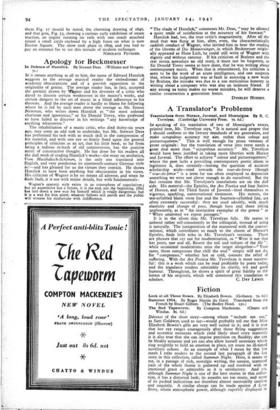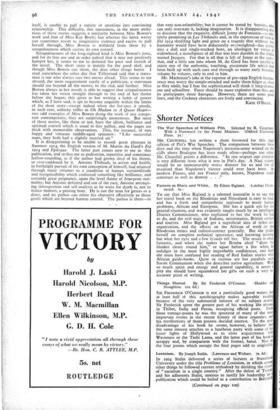Fiction
Devotes of the short story—among whom "include me out," as Sam Goldwyn used to say—would probably tell me that Miss Elizabeth Bowen's gifts are very well suited to it; and it is true that her eye ranges courageously after those flying suggestions and eccentric moments which yield likely short story material; it is also true that she can impose precision on fluidity; she can be bleakly accurate and yet can also allow herself sentences which ring weightily to hold an emotion in place, yet rouse no ill-timed novelistic echoes. As an example of what I mean by this last merit I refer readers to the second last paragraph of the last story in this collection, called Summer Night. Here, it seems to me, in a passage of rich, nostalgic writing, the uneasy, scattered pain of the whole theme is gathered up and resolved with an emotional grace as admirable as it is satisfactory. And yet, although Summer Night is one of the best stories in this collec- tion, it has a distorted look; its assaults are too many, and some of its packed indications are therefore almost necessarily careless and ungainly. A similar charge can be made against A Love Story, where atmospheric power, although superbly displayed 10
itself, is unable to pull a variety of emotions into convincing relationship. This difficulty, this uneasiness, in the more ambi- tious of these stories suggests a similarity between Miss Bowen's work and that of Miss Kay Boyle; but whereas the latter writer can sometimes resort to imaginative violence and excess to pull herself through, Miss Bowen is withheld from these by a scrupulousness which carries its own reward.
Scrupulousness of the long-sighted kind is Miss Bowen's lone, and for its free use and in order indeed that it may not positively hamper her, it seems to me to demand the pace and stretch of the novel. The short story is mainly for the good shot, and though Miss Bowen can shoot, she does other things better. I read somewhere the other day that Talleyrand said that a states- man is one who always sees two moves ahead. This seems to me absurd, the mere requirement surely . of a politician; a statesman should see beyond all the moves, to the end, and further. Miss Bowen always in her novels is able to suggest that scrupulousness has taken her vision straight through to the end of her' theme before she began; this gives to her writing a habit of power which, as I have said, is apt to become ungainly within the limits of the short story—except indeed when she forsakes it utterly, in such rare, unlucky trifles as Oh Madam or A Queer Heart— two odd examples of Miss Bowen doing the work of any compe- tent contemporary; they are surprisingly anonymous. But most of these stories, like them or not, have the idiom, brilliance and spiritual control which is usual to this author, and the pages are thick with memorable observations. This, for instance, of two happy and virtuous middle-aged spinsters : "Like successful nuns, they both had a slightly married air." It is disappointing to be unable to record great pleasure in Summer 1914, the English version of M. Martin du Gard's Ete 1914 and Epilogue. The latter part comes new to me in this publication, and strikes me as pedestrian, repetitive and sometimes hollow-sounding, as if the author had grown tired of his theme, or over-saddened by it. Antoine Thibault, in action and health, in forthright pursuit of his own conception of himself, had attained through many volumes to a condition of human verisimilitude and recognisability which conferred something like brilliance, and certainly great poignancy, upon the level theme of bourgeois nor- mality; but Antoine defeated and out of the race, Antoine attempt- ing introspection and self-analysis as he waits for death is, not to mince matters, a prosing bore. He is not the man for Letters or a diary, and no pathos can relate his character effectively to those griefs which are beyond human control. The pathos is there—in that very non-relatability; but it cannot be stated by lintoine, who can only overstate it, lacking imagination. It is disappointing also to discover that the exquisite, difficult Jenny de Fontanin—so Sufi. nitely promising in Les Thibaults and, in the expression of love in Ete 1914 shedding light and grace on a tragedy that without her humanity would have been didactically overweighted—has grown into a dull and single-tracked bore, an ideologist by virtue or widowhood, a mouthpiece of all that was least durable in the tragic, wasted Jacques. For that is all that is left of Jenny at the end.- that, and a little son into whom M. du Gard has been unable to inject any of the authentic, touching, passionate life which had been built up with such care and through so many early beauties, volume by volume, only to end in him.
Mr. Mackenzie's joke at the expense of pre-15439 Eriglish bureau. cracy may worry the simple-minded and make them fidget as often as they smile, but I fear the sophisticated will think it long-drawn- out and schoolboy. Farce should be more explosive than this, and its participants more baroque. However, there are some good lines, and the Cockney characters are lively and convincing.
KATE O'BRIEN.































 Previous page
Previous page